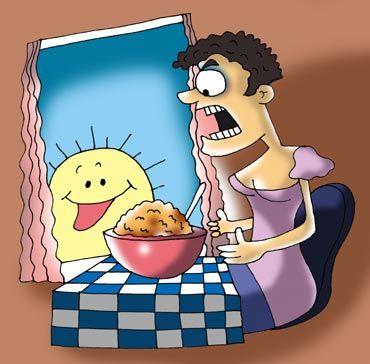Photographs: Rediff Archives Shameem Akthar
Shameem Akthar, yogacharya trained with the SivanandaYogaVedantaCenter, presents the other side to this hype, and advises caution.
Ever so often, when a celeb goes on a six-pack or fab bod diet, media ink will also be spent on a “high protein” diet that has been part of this high-profile strategy. In fact, amongst all the fad diets in the market, this one has lasted the longest. But can too much of a good thing (protein) also be too bad, at times?
It is not just about ketone build-up, but may be something as awkward as bad breath! Self-prescribing a high protein diet can be more dangerous simply because it can lead to medical complications, aesthetic disasters (too many egg yolks at one go, for instance, can cause inflammatory breakouts on the skin) and emotional yo-yos.
In Ayurveda, diet charts have to be only prescribed based on individual doshas (ayurvedic personalities). In fact, a high-protein diet is advised for the vata dosha (air element), but with proper spices to help them digest it, since their digestion is weak.
Pitta dosha (fire element) is also advised proteins since their digestion needs that challenge.
However, kaphas dosha (earth element), though normally overweight, are advised against too much protein. As you can see the alternative dietary route is rather different from the modern day habits.
What applies as dietary model for one person may not work for another, so sharing diet charts or consuming protein supplements on the say-so of another can be outright dangerous.
Click on NEXT to continue reading...
The dangers of a high protein diet
Photographs: Uttam Ghosh
Bad breath: The body needs glucose and fat as fuel. But unfortunately, with a high protein diet, glucose is not available and the fats cannot be metabolized properly to fulfill this need. So the body uses ketones which form an alternative emergency energy source. Unused ketones tend to build up in the body, creating an imbalance.
Their build up is also the cause for a certain type of bad breath and perhaps even the foul smell in the sweat! A certain amount of carbohydrates is needed to prevent this.
Kidney problem: The kidney and ketone connection is well documented. But it may be worthwhile repeating it. When there is an overload of ketones, the kidneys are the one which are severely hit, because they are unable to process them fast enough. This can cause serious ketone build up, hitting the kidneys.
Since kidneys are stolid, silent workers one often never wakes up to the fact that they are in trouble, until it is too late. And what is lesser known is the kidney and heart connection, which means if your kidney is in trouble, your heart is likely to protest sooner than later. Most kidney problems lead to a heart problem eventually. The more immediate danger of ketone overload can be something limiting as dangerous levels of dehydration.
Toxic condition: In fact, it has been found that certain toxic condition, from food allergies, get exacerbated in those with high protein diets. (Eg: aflatoxin from the skin of certain nuts). This is because a high protein diet also overloads our detox gland – the liver.
Calcium absorption is said to be hit when the protein intake is too high. This can lead to bone problems, especially in women. With less fibre, there is more likelihood of constipation.
Emotional issues: In Ayurveda protein is regarded as a “grounding” food item. But how much of it can be good for you is a matter that is best left to ayurvedic experts. When it is overconsumed, it can cause dehydration (as explained above, due to kidney overload) and this in turn can increase your sense of anxiety, because it causes palpitations. When combined with a low carb diet, it can also lead to other seemingly unrelated emotional conditions: chronic fatigue syndrome making you feel tired.
If the fibre content is low, it can cause constipation, making you feel bloated. Without carbs, which are the nutrient trigger for the feel-good hormone serotonin, you are likely to feel depressed, without knowing the cause. It can also cause insomnia and further lead to nutrient imbalance, adding to your woes. Some chemicals are needed for triggering the oxytocin – motivational hormone, making you actually suffer low drive.



Comment
article